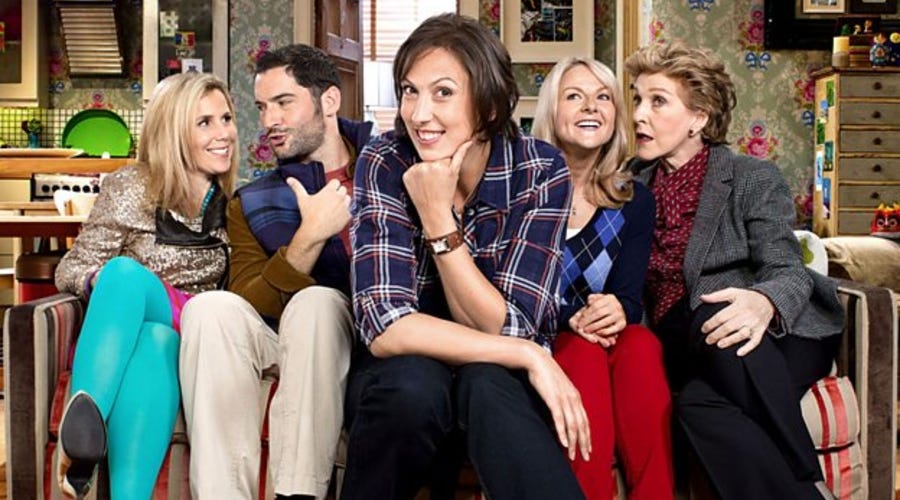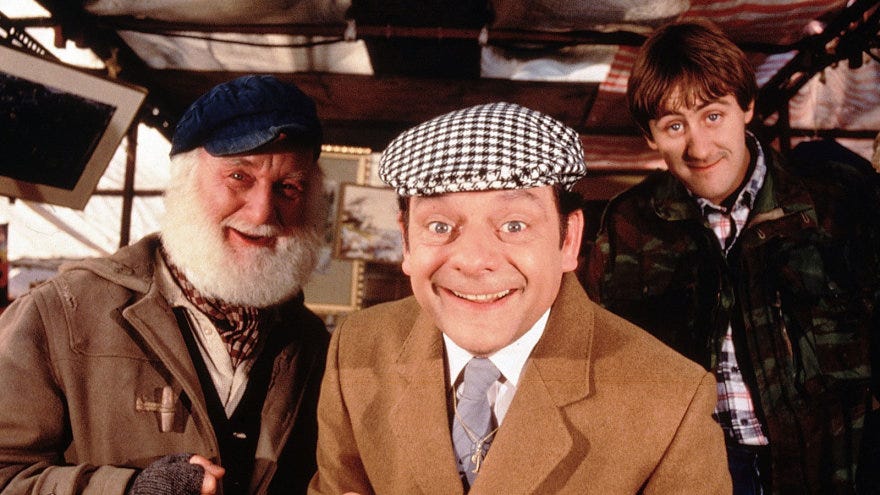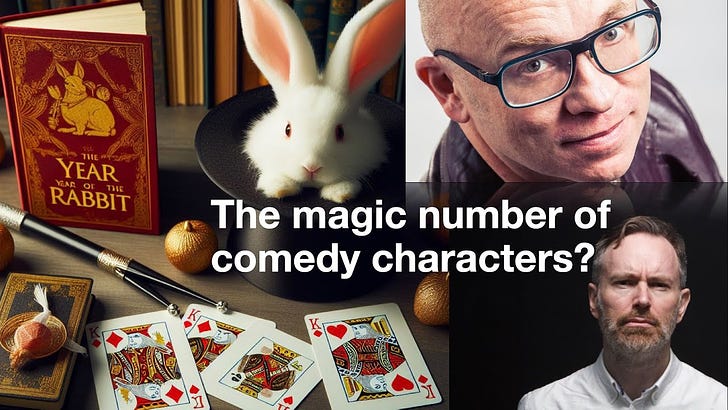Is mainstream comedy in crisis? That’s the question I keep hearing, and very rarely do I get a straight answer.
This question was tackled by Broadcast Magazine who just ran an interesting round-table discussion on the subject. They were asking the people who really are the generals and field marshals of comedy including big name producers like Jimmy Mulville (Hatrick) and controllers and commissioners like Charlie Perkins (C4) and Jon Petrie (BBC).
Last week, at the BBC Comedy Festival in Glasgow, Petrie was reported as admitting “there is still a dearth of joke-packed ideas coming through the doors.” And he can’t commission what he’s not being offered. So what’s the problem?
If I’d been involved in the discussion, I’d have said one thing about the problem facing mainstream comedy – and especially the elusive studio sitcom. It is this:
We’ve lost the balance between ‘art’ and ‘entertainment’.
Art is about the artist. Entertainment is about the audience.
High quality mainstream comedy can be – and indeed should be – both.
Comedy as Art
Today we have many authored comedies with fresh and original comedy voices that express a very personal view of life. It’s about lived experience from a particular perspective, be it ethnicity, sexuality, neurodivergence or whatever. I’ve got no problem with that. When you discover something that you can relate to, that speaks into your world or that captures something that had been rolling around in the back of your head for years, it is wonderful and enthralling.
As someone who wanted to work in TV, and then did, The Larry Sanders Show was that show for me. I had the same feeling reading the book Conversations with my Agent by Rob Long (and listening to his podcast). Then there’s Stewart Lee and it’s all about the joke he’s not doing, just like some kinds of jazz are all about the notes they’re not playing. That stuff is specific, authentic and personal. I’m going to call it art and you can’t stop me.
Comedy as Entertainment
I’m just about old enough to remember Morecambe and Wise who had honed their craft entertaining a live audience, drawing people in and delighting them. Just thinking about them makes you smile. And in the 1980s, you also had Benny Hill, Frankie Howerd, Cannon and Ball, Bob Monkhouse, Little and Large and, my dad’s favourite, Bruce Forsyth.
The two biggest influences on me were probably The Two Ronnies and my all-time favourites, Fry and Laurie. And then there were the panel games, which excelled in the ‘90s with Have I Got News for You?, Never Mind the Buzzcocks and They Think It’s All Over. The sketches and characters kept coming from Harry Enfield, Paul Whitehouse, French and Saunders, Absolutely and then the next generation like Armstrong and Miller, Mitchell and Webb and Smack the Pony.
All of the above were entertainers, extremely experienced at making a roomful of people laugh. Out loud. In a way that the microphones could hear. It is from this tradition that we get mainstream studio comedy from Terry and June to Drop the Dead Donkey.
But it’s not just venal crowd-pleasing. Every sitcom need a strong dash of authenticity: art. Maybe it’s a sliding scale or a spectrum. Maybe it’s overlapping venn diagrams. But let’s take two comedies to illustrate the point: Miranda and Fleabag.

A Tale of Two Comedies
I declare an interest in the first: Miranda. I was involved in the first two series. (I’m particularly proud of the hotel/holiday episode). Miranda was initially disliked by critics as goofy mainstream fare when it landed on BBC2 on 9th November 2009 at 8.30pm, which was not even a comedy slot at the time. This was, I believe, at the correct and heroic insistence of BBC Exec producer, Jo Sergeant.
The audience responded well. We were onto something. The show rapidly found a tribe. It turns out everyone either is a Miranda, feels like one in their heads, or knows a Miranda. There was the person struggling to fit in, and not wanting to grow up with parental pressure of a dominant mother, constantly disappointed by her daughter wasting her life. Miranda was channelling something and the ‘art’ was there.
What I witnessed during the two series for which I was in the room was Miranda’s total commitment to delighting – and entertaining - the audience. She had spent years honing her craft in front of a live comedy audience at the Edinburgh Fringe performing sketches. She had also stolen the show as a cleaner in Not Going Out, gained experienced as Teal in Hyperdrive and had memorable cameos in shows like Lead Balloon.
The entertaining sensibility was also clear from the Perry and Croft-style ‘You have been watching’ closing credits where characters waved at the audience, who loved it. The Christmas special for Series 3 on 26thDecember 2012 was watched by 11.55 million viewers. That’s a lot, even in 2012.
The Provenance of Fleabag
Fleabag began four years later in 2016 and was based on Phoebe Waller-Bridge’s fringe play of the same name. Let’s just note that. It was based on a play – which is art – rather than a sketch show – which is entertainment. Miranda and Fleabag are not wildly dissimilar in subject matter. They are both young single women breaking the fourth wall. But they differ significantly in tone, sensibility and provenance. It was an instant hit with critics and garnered 100% on Rotten Tomatoes. Wikipedia says:
According to Metacritic's aggregate of decade-end lists, Fleabag was the second-highest ranked show of the 2010s. In 2019, it was ranked 8th on The Guardian's list of the 100 best TV shows of the 21st century. In 2022, Rolling Stone ranked Fleabag as the fifth-greatest TV show of all time. Former United States President Barack Obama named the second season of Fleabag among his favourite films and television series of 2019.
Fleabag is the kind of television that many aspiring writers want to write. It’s personal and authentic. It’s about identity. And we should not be surprised that we’re getting lots of these scripts because much of the energy in training new writers is finding new voices with stories to tell. It is laudable as an aim to include the marginal and the excluded. But to succeed through these opportunities, you’d be best advised to lean into your own personal experience and your world, creating personal authentic art rather than crowd-pleasing entertainment.
Fleabag was all done in twelve episodes, three years apart. It’s art. And you could hardly ask for better critical reception. But did Fleabag get 11.55m viewers on Boxing Day on BBC1? No. It wasn’t trying to. Because it’s not ‘entertainment’. It’s theatre. It’s art.
The Theatre, The Theatre. What’s Happened to the Theatre?
This is the question asked by Danny Kaye’s character in the unashamedly entertaining and sentimental White Christmas, which was the highest grossing movie of 1954. There’s a gem of a song in it (below) which sums up the difference between ‘art’ and ‘entertainment’. Dressed as a progressive beatnik, completely out of place in a Bing Crosby movie, Danny Kaye wonders where all the tap dancing and high kicks went before singing “instead of dance, it’s choreography.” He then does a dance routine with some serious-looking girls which is comically pretentious.

There’s no need to be sniffy about art (choreography), or snobby about entertainment (dance). Both have their place. Both have something to teach the other – and regularly do.
2012 wasn’t just the 11.55m Miranda episode. It was the year of the London Olympics Opening Ceremony, which perfectly combined art (choreography) and entertainment (James Bond and Mr Bean) in a truly wonderful way that none of us who watched it will ever forget. Danny Boyle knows a thing or two about Art and Entertainment, having directed Shallow Grave, Trainspotting, Yesterday, two episodes of Inspector Morse and, my own personal favourite, Millions.
How We Ended up with Only Fools and Horses
So let’s wrap this up by looking at one of the all-time truly great sitcoms: Only Fools and Horses. This show demonstrates that truly great mainstream comedy bridges the gap between art and entertainment.
Only Fools and Horses is an authentic portrayal of working-class life in Peckham. It was a world that Sullivan knew, having grown up down the road in Balham, the son of plumber. He’d failed his 11-plus, left school with no qualifications and did all kinds of jobs including carpet-laying and window-cleaning. He’d always wanted to write, inspired by Steptoe and Son and Til Death Do Us Part. Eventually Sullivan got a job on The Two Ronnies making props, where he was encouraged to submit sketches. He learned his writing craft honing sketches that had to make a studio audience laugh out loud – and millions at home laugh too. This was entertainment.
When Sullivan’s chance came to write a sitcom, he came up with a show about a young Marxist which became Citizen Smith. It was filmed in front of a studio audience and ran for four series. And then came Only Fools and Horses, the show he was born to write and which contained plenty of his real life experiences – and those of his family. It was authentic and personal. And it was entertaining.
Could we have had Only Fools and Horses without The Two Ronnies? Would John Sullivan have qualified as ‘an emerging voice’, ending up on a writers scheme being nurtured (although he probably couldn’t have afforded the time) – and would he have learned how to write entertainingly as well as authentically?
Sketch Shows are Essential because they are Entertaining
The Two Ronnies also provided work and experience for David Renwick (One Foot in the Grave, Jonathan Creek), David Nobbs (Reggie Perrin), Ian Davidson and Peter Vincent (Brittas Empire) and others.Absolutely Fabulous sprang from a French and Saunders sketch. Not the Nine O’Clock News gave us Richard Curtis (Blackadder, Vicar of Dibley) and Andy Hamilton (Drop the Dead Donkey, Outnumbered) There’s a direct line from Ghosts to Horrible Histories. Writers learned how to entertain and then wrote mainstream sitcoms.
Their predecessors learned their craft through music hall, variety and entertaining the troops. Spike Milligan, Harry Secombe, Perry and Croft learned their craft on stages close to the front line, trying to bring joy to tired, working class men. That focusses the mind.
Theories are about comedy are all very well but let’s not forget the words of Ken Dodd, with which I began by book, The Sacred Art of Joking:
Freud said that laughter is the outward expression of the psyche. But Freud never had to play the old Glasgow Empire on a Saturday Night.
A while back, I heard a TV executive think about how to crack the mainstream sitcom given it’s an old-fashioned format. I wanted to shout out that it isn’t old fashioned. Mainstream studio sitcoms are still immensely popular. People are still watching them for the nth time on Netflix or UK TV. I’m showing my kids Blackadder, Seinfeld and thinking about Red Dwarf. My oldest daughter has just finished Friends. Studio sitcoms are not an old-fashioned format as kids are watching these classic shows for the first time – and bingeing them? Why? Because they are entertaining.
Anyway, that’s what I would have said in that room of TV controllers and execs. In fact, I probably wouldn’t have done. I’d have said that I’ve just written a really authentic but entertaining mainstream script – on spec – and that they could read it if they wanted… Do have a word with my agent.
Am I onto something? What do you think? Leave a comment below. What do others think? Why not share this with them and ask them?
If you’ve found this helpful and interesting, there’s loads of advice here about how to actually writing entertaining sitcoms. I’ve written episodes of My Family, My Hero, Citizen Khan, Shakespeare and Hathaway and numerous shows on BBC Radio 4 like Hut 33 and Think the Unthinkable. Why not subscribe? It’s free.
And you could also look at my last instalment which is an interview with brilliant comedy writer and cartoonish, Andy Riley:
Writing Sitcoms with Andy Riley
After I asked Andy Riley about his movie, Seize Them!, I asked him about writing sitcoms. Here’s what he said:
So here’s the Danny Kaye song, which is well worth your time.
And I stumbled across this. Such fun!








As someone trying to find a way into the comedy world without being a writer-performer (or writer-producer, writer-director, or just writer-fabulously wealthy heiress), I think the problem with the view that "there is still a dearth of joke-packed ideas coming through the doors" is that the doors are all shut. How would they know if there are joke-packed ideas out here when it's impossible to get them, well, in there?
I've been to the last two Big Comedy Conferences, and advice for new writers is self-contradictory at best and not a reflection of reality at worst. We're told to reach out to producers directly because you can't get an agent without a credit, but then producers don't take unsolicited, unagented scripts (even when they say they do). We're told agents aren't there to get you work, but to represent you when you've got work, but in terms of actually finding work we're left with competitions and open calls, which are a soul destroying slog that frankly are no good to man nor beast. We're told to get an entry level job in the industry just to get access, but also told that that's pointless and we should focus on writing. (Also I'm 53. I'm not about to take a job as a 24/7 dogsbody.)
I've been thinking for months that we need a whole new process for surfacing talent that doesn't depend on taking a punt on a low-level job, or on oversubscribed and under-resources new writers' schemes and competitions, or on getting very lucky and just happening to meet the right person at the right time.
In the tech world, we talk about 'security through obscurity' or 'the practice of concealing the details or mechanisms of a system to enhance its security', which doesn't actually work. The TV world appears to practice 'commissioning through obscurity' or 'the practice of concealing the details or mechanisms of the commissioning system to decrease the number of applicants'. That clearly doesn't work either, because I'm pretty sure that there isn't actually a lack of talent. Humans haven't suddenly become less funny.
I know I might sound frustrated, and I suppose I am a bit. Trying to break in to TV feels very much like having to learn to burgle a house. I'm absolutely sure that there are some really great writers out there who just can't work out how to fight their way in because the whole system is so broken.
From the States perspective, not enough money for streamers to dump into more than 8 episodes of the multicam entertainment-first model, even though that's how a lot of the old shows are so re-watchable, because you can get lost in them as a whole 26-episode season just carries you along with a reliable story engine. When we just get 8 episodes of That 90s Show, it makes the format look outdated in-and-of itself, not taking into account the weekly release model, the slow building of a connection with an audience, the strengthening of characters people were connecting with more, and the writing-out of those they weren't, etc... the format is still great. The delivery system needs to be readjusted for it.